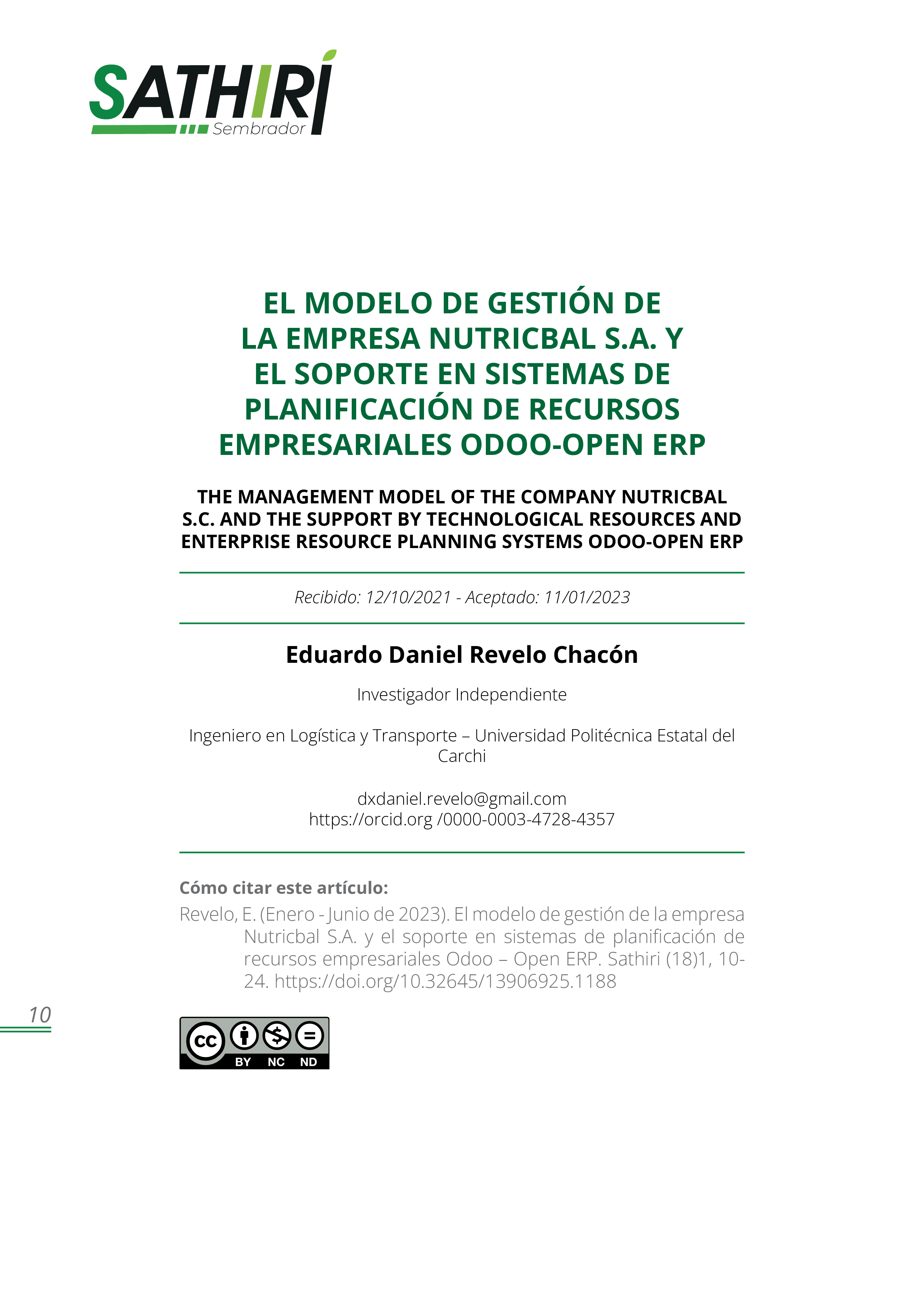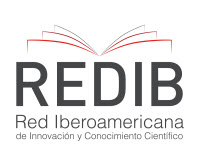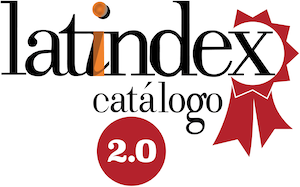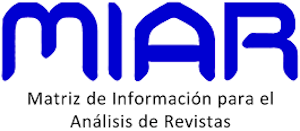The management model of the company Nutricbal S.C. and the support by technological resources and enterprise resource planning systems Odoo-Open ERP
DOI:
https://doi.org/10.32645/13906925.1188Keywords:
Management model, process efficiency, enterprise resource planning, Cobit 5.0, maturity modelAbstract
The objective of this research focuses on determining the management model for the company Nutricbal S.A. through the configuration of an enterprise resource planning system (ERP) open source, to improve the efficiency of the processes in such a way that, to achieve this objective, the current situation of the company was evaluated based on performance indicators (KPIs) of time, costs and resources to measure the efficiency of the processes and in the same way the methodological framework of COBIT 5 was applied. 0, which measures the use of information technologies (IT) at the supply chain level, establishing a maturity level of 1. Subsequently, the modules of purchasing, inventory, warehousing, manufacturing, customer relationship management (CRM), sales, billing, website and e-commerce were configured in Odoo, which is an open source system that is able to adapt to any type of company, be it small, medium or large. Finally, based on the simulation of the management model, the KPIs were measured, achieving an optimization in the efficiency of logistics processes (supply, storage, production and distribution) in terms of time, costs and resources, placing the management model in a maturity level 5 due to its automation and digital transformation of the business.
References
Andonegi, J., Casadesús, M. y Zamanillo, I. (2005). Evolución histórica de los sistemas ERP: De la gestión de materiales a la empresa digital. https://ojs.ehu.eus/index.php/rdae/article/download/11475/10631
Boza, A. (2019). Implantación de un sistema ERP en una empresa de Ortopedia. https://riunet.upv.es/bitstream/handle/10251/126080/Terol%20-%20Implantaci%c3%b3n%20de%20un%20sistema%20ERP%20en%20una%20empresa%20de%20ortopedia.pdf?sequence=1&isAllowed=y
Ekos. (2019). Presente del ERP Ecuador, Tendencias y Desafíos. Recuperado de http://www.sidesoft.com.ec/presente-del-erp-ecuador/
ERP Integra. (2010). ¿Qué es un ERP? Recuperado de http://erpintegra.com/homepage/index.php?option=com_content&view=article&id=29&Itemid=51
Flor, M., Mejía, C. y Rengifo, A. (2016). Ventajas y desventajas de la aplicación de sistemas ERP en las operaciones de las empresas del sector comercial en El Salvado. https://webquery.ujmd.edu.sv/siab/bvirtual/BIBLIOTECA%20VIRTUAL/TESIS/01/AEM/0002386-ADTESFV.pdf
Iglesias, M. y Rodríguez, F. (2009). Factores explicativos de la implantación de los Erp en las Pymes: El caso de Cantabria. Revista Internacional de la Pequeña y Mediana Empresa ISSN, 1989, 1725.
IT Governance Institute. (2007) Cobit 4.1. https://www.itgi.org
ISACA. (2012). Cobit 5. https://www.isaca.org/COBITus
Mogrovejo, J. (2017). Implementación del ERP open source Odoo en una Pyme (tesis de maestría). Escuela Superior Politécnica del Litoral, Guayaquil, Ecuador.
Pavón, Y., Puente, L. Infante, M. y Blanco, J. (2018). Experiencia de trabajo para la configuración del ERP Odoo en pequeños negocios. Caso de éxito en TostoneT. Revista chilena de ingeniería, 26(3). http://dx.doi.org/10.4067/S0718-33052018000300514
Sander, B. (2002). Gestión y administración de los sistemas educacionales: Problemas y tendencias. http://www.educando.edu.do/files/4313/4643/1519/NUEVAS_TENDENCIAS_EN_LAGESTIN_EDUCATIVA.pdf
Sandoval, F. Campo, J. y Banquez, F. (2018). Sistema ERP para el sector ganadero venezolano basado en una solución de código abierto. Ingeniería Industrial, 22(87). http://uctunexpo.autanabooks.com/index.php/uct/article/view/185
Santacruz, J., Vega, C., Pinos, L. y Cárdenas, O. (2008). Sistema Cobit en los procesos de auditorías de los sistemas informáticos. https://revistas.utb.edu.ec/index.php/sr/article/view/342/264
Sastre, P. (2020). Desarrollo para una aplicación en Odoo ERP. https://riunet.upv.es/bitstream/handle/10251/151984/Sastre%20-%20Desarrollo%20de%20una%20aplicaci%c3%b3n%20para%20Odoo%20ERP.pdf?sequence=1&isAllowed=y
Stallman, R. (2002). Free Software, Free Society: Selected Essays of Richard M. Stallman. https://www.gnu.org/philosophy/fsfs/rms-essays.pdf
Valdés, M. (2019). Módulos o Apps de Odoo para la gestión de Pymes: alcanzando el éxito con un solo software. https://www.octupus.es/modulos-de-odoo-para-la-gestion-de-pymes-alcanzando-el-exito-con-un-solo-software/
Velásquez, A. (2003). Modelo de gestión de operaciones para PyMES innovadoras. Revista Escuela de Administración de Negocios, (47), 66-87. https://journal.ean.edu.co/index.php/Revista/article/view/234/227

Downloads
Published
Issue
Section
License
Copyright (c) 2023 Eduardo Daniel Revelo Chacón

This work is licensed under a Creative Commons Attribution-NonCommercial-NoDerivatives 4.0 International License.
El autor mantiene los derechos morales e intelectuales de su obra, autorizando a la editorial de la revista Sathiri la difusión y divulgación de su contenido con fines estrictamente académicos y de investigación, sin fines de lucro. Así mismo, se autoriza que la obra sea descargada y compartida con otras personas, siempre y cuando no sea alterada y se reconozca su autoria.





















